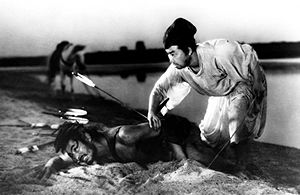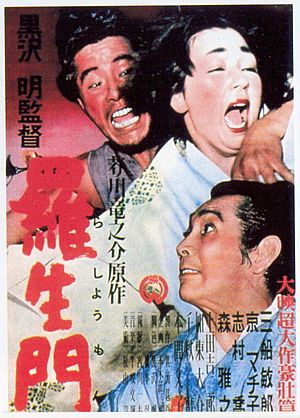Rashomon facts for kids
Rashomon (羅生門, Rashōmon) is a Japanese movie directed by Akira Kurosawa and released in 1950.
The movie is based on two short stories by Ryūnosuke Akutagawa.
The film is known for a plot device that involves various characters providing subjective, alternative and contradictory versions of the same incident. Rashomon was the first Japanese film to receive a significant international reception; it won the Golden Lion at the Venice Film Festival in 1951, was given an Academy Honorary Award at the 24th Academy Awards in 1952, and is considered one of the greatest films ever made. The Rashomon effect is named after the film.
Editing
Stanley Kauffmann writes in The Impact of Rashomon that Kurosawa often shot a scene with several cameras at the same time, so that he could "cut the film freely and splice together the pieces which have caught the action forcefully as if flying from one piece to another." Despite this, he also used short shots edited together that trick the audience into seeing one shot; Donald Richie says in his essay that "there are 407 separate shots in the body of the film ... This is more than twice the number in the usual film, and yet these shots never call attention to themselves."
Music
The film was scored by Fumio Hayasaka, who is among the most respected of Japanese composers. At the director's request, he included a bolero during the woman's story.
Due to setbacks and some lost audio, the crew took the urgent step of bringing Mifune back to the studio after filming to record another line. Recording engineer Iwao Ōtani added it to the film along with the music, using a different microphone.
Similar movies
The 1964 movie The Outrage was a remake of Rashomon. Kurosawa was acknowledged for the screenplay. The movie's concept is also mirrored in many other movies, including Hero, Vantage Point, Courage Under Fire and Basic.
Cast

- Takashi Shimura as Kikori, The Woodcutter
- Minoru Chiaki as Tabi Hōshi, The Priest
- Kichijiro Ueda as The Commoner
- Toshiro Mifune as Tajōmaru, The Bandit
- Machiko Kyō as The Wife
- Masayuki Mori as The Samurai
- Noriko Honma as Miko, The Medium
- Daisuke Katō as Houben, The Policeman
Related pages
Awards and honors
- Blue Ribbon Awards (1951) – Best Screenplay: Akira Kurosawa and Shinobu Hashimoto
- Mainichi Film Concours (1951) – Best Actress: Machiko Kyō
- Venice Film Festival (1951) – Golden Lion: Akira Kurosawa
- National Board of Review USA (1951) – Best Director: Akira Kurosawa and Best Foreign Film: Japan
- 24th Academy Awards, USA (1952) – Honorary Award for "most outstanding foreign language film"
Top lists
The film appeared on many critics' top lists of the best films.
- 5th – Top ten list in 1950, Kinema Junpo
- 10th – Directors' Top Ten Poll in 1992, Sight & Sound
- 10th - 100 Greatest Films list in 2000 The Village Voice
- 76th - "Top 100 Essential Films of All Time" by the National Society of Film Critics in 2002.
- 9th – Directors' Top Ten Poll in 2002, Sight & Sound
- 13th - Critics' poll in 2002, Sight & Sound
- 290th – The 500 Greatest Movies of All Time in 2008, Empire
- 50 Klassiker, Film by Nicolaus Schröder in 2002
- 1001 Movies You Must See Before You Die by Steven Jay Schneider in 2003
- 7th – Kinema Junpo's The Greatest Japanese Films of All Time in 2009.
- 22nd – Empire magazine's "The 100 Best Films Of World Cinema" in 2010.
- 26th - Critics top ten poll, 100 Greatest Films of All Time, Sight & Sound magazine (2012)
- 18th - Director's top ten poll, 100 Greatest Films of All Time, Sight & Sound magazine (2012)
- Woody Allen included it among his top ten films.
- 4th - BBC's list of "100 greatest foreign language films" in 2018.
See also
 In Spanish: Rashōmon (película) para niños
In Spanish: Rashōmon (película) para niños


